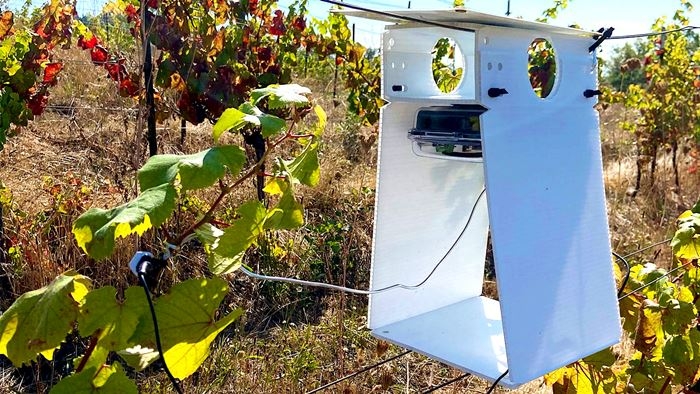AI and Robotics meet organic winemaking
The “Pied Piper” of vineyards: AI-Powered pest control for a greener future
2024-01-30

In the verdant landscapes of Oregon's Willamette Valley, a pioneering project is merging the ancient art of winemaking with the futuristic realm of artificial intelligence and robotics. At Oregon State University (OSU), a unique initiative is underway that could revolutionize the way vineyards manage pests, potentially ushering in a new era of sustainable, chemical-free agriculture.
Titled the "Pied Piper," this prototype robot represents a groundbreaking approach to pest control in vineyards. Developed by the Department of Biological and Ecological Engineering at OSU, the Pied Piper is designed to disrupt the mating rituals of common vineyard pests, such as treehoppers and stink bugs, using harmonic vibrations. This technology aligns with the principles of organic, sustainable, and biodynamic farming, promising an eco-friendly alternative to traditional chemical methods.
The Pied Piper works on a simple yet ingenious principle. Treehoppers, known for spreading the grapevine red blotch virus—a disease that impedes the photosynthetic efficiency of vines—communicate and find mates through vibrations. The robot listens for these mating calls and responds with its own set of vibrations. This interference creates a 'crowded' vibrational environment, making it challenging for male treehoppers to locate potential mates.
Stag Hollow Winery, a proponent of sustainable and biodynamic farming methods, has become one of the first estates to test the Pied Piper in its vineyards. The winery's owner, Mark Huff, expressed enthusiasm about the potential of this technology to provide an alternative to pesticides, emphasizing its alignment with the ethos of sustainable viticulture.
While the concept of using vibrational mating disruption (VMD) in agriculture is novel in the United States, it is not without precedent. The OSU team credits their inspiration to Italian entomologists Dr. Rachele Nieri and Dr. Valerio Mazzoni from the Edmund Mach Foundation (FEM), a viticultural research institute in Trentino, Italy. Nieri and Mazzoni have led a five-year study into the use of VMD in vineyards, focusing on organic viticulture research. Their findings, first published in 2019 and updated in 2023, demonstrate the efficacy of VMD as a safe, non-invasive method to reduce treehopper populations.
This technology stands at the intersection of tradition and innovation, blending the age-old practices of biodynamic farming with cutting-edge AI and robotics. The collaboration between researchers, winemakers, and technologists could mark a significant step forward in sustainable agriculture, offering a template for other sectors looking to reduce their environmental impact.
The Pied Piper project is not just about pest control; it's a symbol of the evolving relationship between technology and nature. As this technology continues to develop and gain traction, it could play a crucial role in shaping the future of green winemaking, preserving the integrity of vineyards while safeguarding the environment.
Founded in 2007, Vinetur® is a registered trademark of VGSC S.L. with a long history in the wine industry.
VGSC, S.L. with VAT number B70255591 is a spanish company legally registered in the Commercial Register of the city of Santiago de Compostela, with registration number: Bulletin 181, Reference 356049 in Volume 13, Page 107, Section 6, Sheet 45028, Entry 2.
Email: [email protected]
Headquarters and offices located in Vilagarcia de Arousa, Spain.